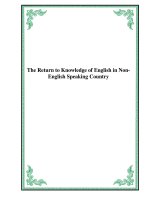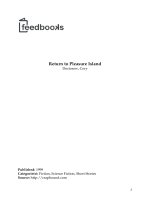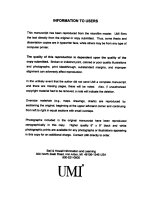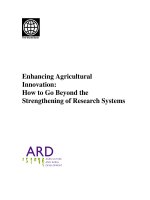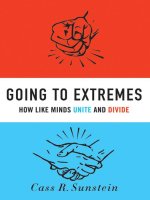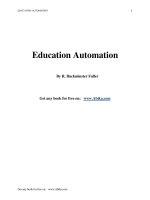Horvat return to order; where weve been, how we got here, and where we need to go (2013)
Bạn đang xem bản rút gọn của tài liệu. Xem và tải ngay bản đầy đủ của tài liệu tại đây (3.46 MB, 286 trang )
Praise for Return to Order
“Return to Order provides an interesting analysis of how the United States has departed from the spiritual, cultural, and economic
precepts that supported the founding and the early history of our republic. It also sets forth valuable recommendations for restoring our
society to its foundation of ordered iberty and traditional values.”
—The Honorable Edwin Meese III
Former Attorney General of the United States
“This is a timely and important book as our nation faces one of the most critical challenges in its history. Overcoming the
economic disaster America is facing cannot be solved simply through economic policy. Americans and their leaders must put in place
policy that will restore values, work ethics, and, as the author points out so well, honor…. Restoring honor to our economic landscape will
put the nation on the path to recovery.”
— Lt. Gen. Benjamin R. Mixon, USA (Ret.)
Former Commanding General, United States Army Pacific
“The depth of knowledge and originality of Horvat’s analysis, plus the scope and inspiration of his vision for a true solution to our
current economic crisis, make Return to Order worthy of becoming the bedside book for those who believe America is worth fighting for.”
— Joseph M. Scheidler
National Director, Pro-Life Action League
“By calling the reader to embrace the cardinal virtues of temperance, justice, prudence and fortitude, Return to Order suggests a
practical pathway to avoid the economic and spiritual crises that are looming before us and, by means of religious conversion, reestablish
a right order for human flourishing. I hope that this work will receive the attention it so deserves.”
— Most Rev. John C. Nienstedt
Archbishop of Saint Paul and Minneapolis
“Horvat’s fabulous analysis of our present crisis can and should be a most important instrument in reshaping the educational
foundations of our youth, preparing them for leadership...”
— David S. Miller
Senior Vice President, US Bank
“John Horvat sounds a clarion call for a return to fiscal and moral sanity. A must read!”
— Col. George E. “Bud” Day, USAF (Ret.)
Medal of Honor recipient and former POW
“The central theme of frenetic intemperance is original, interesting, and compelling. The diagnosis of contemporary social maladies
must focus on moral failings, and Return to Order rightly does so. Its insightful thesis deserves wide circulation and consideration.”
— Kevin E. Schmiesing, Ph.D.
Research Fellow, Acton Institute for the Study of Religion and Liberty;
Book Review Editor, Journal of Markets & Morality
“Inside the chaos of our days, the book is a welcome beacon that helps us get our bearings and set us on the path to true order. It
defines real leadership and calls all to virtue and trust in Providence. It is my fervent hope that this book will get the attention it deserves
and that it will help bring about God’s highest designs for the American people at this crossroads in history.”
— H.I.R.H. Prince Bertrand of Orleans-Braganza
Prince Imperial of Brazil
“If our nation ever needed to return to traditional values, it is now. We are committing suicide; but each of our problems has at its
roots a moral solution found in the tenets of the Christian tradition that is at the foundation of our being. Return to Order does a great job
of highlighting the source and solution to our impending demise.”
— Maj. Gen. Patrick H. Brady, USA (Ret.)
Medal of Honor recipient
“Anyone who considers the ongoing public debate as superficial—indeed most reform proposals merely want to cure the
symptoms, yet do not address the underlying causes—should study Mr. Horvat’s Return to Order. It is to be hoped that this book reaches a
large reading public and will have an impact on public policy, theoretical debates and personal decisions alike.”
— Gregor Hochreiter
Director, Institute of Applied Economics and
Western Christian Philosophy (Vienna, Austria)
“[Horvat] would likely fall into the company of such traditional conservative scholars as Russell Kirk or Richard Weaver. This is a
perceptive and exciting book explaining how these traditional understandings and principle can form the bedrock of our personal and
corporate philosophy today.”
— G. Daniel Harden, Ph.D.
Emeritus Professor of Education, Washburn University
Chairman, Kansas Governmental Ethics Commission
“This excellent work is an in-depth study of the history and cause of our present-day economic and spiritual crisis, and it gives us a
well-reasoned solution to our plight as well. I am pleased to recommend it.”
— Most Rev. James C. Timlin
Bishop Emeritus of Scranton
“Horvat calls for an order that combines the virtues of tested traditions with the creative potential of the free economy: a
combination of a structured order based on traditional values and the spontaneous order of economic systems based on private property.
He uses the term ‘frenetic intemperance’ to describe the type of life which does not leave room for family, creative leisure, and prayer.
A call for more balance in our economies and our lives.”
— Alejandro Chafuen, Ph.D.
President, Atlas Economic Research Foundation
“A fabulous study!”
— Malcolm S. Morris
Chairman, Stewart Title Guaranty Company
“In this very well-documented and argued work, John Horvat ingeniously demonstrates how the four cardinal virtues are the basis
of a free and prosperous society. This is a work that should be on every economics and social science bookshelf. It touches on the very
basis of the problems in our modern economy and society. I highly recommend this enjoyable book.”
— Prof. Harry C. Veryser
Author and Former Director of Graduate Studies in Economics,
University of Detroit Mercy
“The restoration of economic and social peace in our disordered society is something for which all men of good will yearn. John
Horvat has given us in his excellent book, Return to Order, a catechism of principles to guide all our efforts to restore economic and social
peace to America.”
— Most Rev. Rene H. Gracida
Bishop Emeritus of Corpus Christi
“It’s rare that a book of this depth is also such a pleasure to read. Horvat’s critique of contemporary America’s ‘frenetic
intemperance’ rings true, laying bare modern man’s confusion and anomie amid plenty. An erudite cultural sculptor, Horvat chisels away
materialism’s false promises and points toward God as the source of the higher revelation that makes beauty, heroism, nobility, sacrifice
and true vocation discoverable and meaningful.”
— Robert Knight
Columnist and author
“Return to Order touches on matters that apply not only to America but everywhere. Modern economy is in trouble and this book
zeroes in on the problem of frenetic intemperance in an original and convincing manner. Best of all, author John Horvat offers organic
Catholic solutions that are both so needed and so refreshing. I hope this book gets wide circulation and recommend it to all those who
want real answers to vital questions.”
— H.H. Duke Paul of Oldenburg
Director, Brussels Office of Fédération Pro Europa Christiana
“Return to Order is a clear, engaging read that, by delineating some fundamentals of the natural order, will empower you to spot
many of today’s disorders— even some you may have unconsciously bought into. Such was my experience... I was enlightened…. The
book is interesting, clear and enlightening.”
— Patrick F. Fagan, Ph.D.
Director, Marriage & Religion Research Institute (MARRI)
“We have abandoned morality in the economic life, together with beauty and the Christian spirit. In Return to Order, John Horvat
argues that the return to Christian values and their observance, both by entrepreneurs and government leaders, is the best protection
against the present, constantly recurring crises.”
— Paweł Toboła-Pertkiewicz
President, Polish-American Foundation for
Economic Research & Education
“Horvat’s thesis that frenetic intemperance has driven many, if not all, of today’s economic problems bears close consideration....
This book should be read and its recommendations followed by those who know a Return to Order in the twenty-first century is sorely
needed.”
— Lt. Col. Joseph J. Thomas, USMC (Ret.), Ph.D.
Distinguished Professor of Leadership Education,
United States Naval Academy
“Like the true cultural conservative he is, John Horvat takes on the idols of technological, economic, and political power. These
powers exacerbate the human tendency toward frenetic intemperance.”
— Richard Stivers, Ph.D.
Emeritus Professor of Sociology, Illinois State University
“In an intellectually compelling and practical way, Return to Order reminds us that economy and religion are deeply connected, and
that, with the family at the center, we can hope to be freed from the frenzy in which our society finds itself. I highly recommend this
book.”
— Fr. Frank Pavone
National Director, Priests for Life
“This book proposes a revitalization of long standing Christian practices as an antidote to current economic discontinuities. Using
practical minded recommendations to resolve massively complex societal issues, Return to Order is a proposal that should be welcomed by
those looking for a path to economic recovery and a tempering of future disruptions.”
— John B. Powers
President, Chicago Daily Observer
* Titles and affiliation of the above individuals with businesses, institutions or organizations are for identification purposes only
Return to Order
From a Frenzied Economy to an Organic Christian Society—
Where We’ve Been, How We Got Here, and Where We Need to
Go
John Horvat II
York Press
York, Pennsylvania
Copyright © 2013 The American Society for the Defense of Tradition, Family and Property® - TFP®
For information about special discounts for bulk sales, please contact:
Return to Order
P.O. Box 1337, Hanover, PA 17331
Tel.: (855) 861-8420
Email:
Unless otherwise noted, all Scriptural references are from the Douay-Rheims version of the Bible.
All rights reserved. No part of this publication may be reproduced, stored in a retrieval system, or
transmitted, in any form or by any means, electronic or mechanical, including photocopying, recording
or any information storage and retrieval system, without prior written permission from The American
Society for the Defense of Tradition, Family and Property® - TFP®.
The American Society for the Defense of Tradition, Family and Property®, TFP®, and York Press
are assumed names of The Foundation for a Christian Civilization, Inc., a 501(c)(3) tax-exempt
organization.
ISBN: 978-0-9882148-2-8 (ebook)
Library of Congress Control Number: 2012953937
Printed in the United States of America
Dedication
To Prof. Plinio Corrêa de Oliveira,
Catholic thinker, man of action, and champion for the cause of Christian civilization.
His example and great virtue gave courage to many. His Catholic vision inspired this
work.
Table of Contents
Foreword
Introduction
Back on Course
PART I:
The Long Brewing Storm
Chapter 1
The Dominant American Model: A Cooperative Union
Chapter 2
Why This Model Failed: A Frenetic Intemperance
Throwing Off Restraint
Chapter 3
The Industrial Revolution: A Defining Point for Frenetic Intemperance
Chapter 4
The Drive to Gigantism
Chapter 5
The Paradox of Mass Standardization
Chapter 6
Breaking Down Barriers
Chapter 7
Interdependence and Complexity
A Threatened Way of Life
Chapter 8
Unraveling a Way of Life
Chapter 9
The Frustration of Technology
Chapter 10
The Consequences of the Abuse of Technology
Chapter 11
The Implosion of Individualism
Chapter 12
Postmodern Individualism: Splitting the Atom
Chapter 13
The Exhaustion of Materialism
Chapter 14
The Absence of the Sublime
Chapter 15
The Rule of Money
At a Crossroads
Chapter 16
Rejecting False Alternatives at the Crossroads
Chapter 17
Returning to an Economy without Frenetic Intemperance
PART II
The Road Ahead: A Return to Order
Chapter 18
A Salvific Debate: Becoming a Nation, Becoming a People
Chapter 19
Preliminary Objections: Can Medieval Economy Be a Solution?
Chapter 20
What Might Have Been, What Could Still Be
Foundations of an Organic Order
Chapter 21
Organic Society: An Unknown Ideal
Chapter 22
Organic Remedies and Upright Spontaneity
Chapter 23
A Virtuous Order
Chapter 24
A Providential Order
The Heart and Soul of an Economy
Chapter 25
Reviving the Heart and Soul of an Economy
Chapter 26
Autonomy, Authority, Vital Flux, and Subsidiarity
Chapter 27
The Spirit of the Family
Chapter 28
The Misunderstood Feudal Bond
Chapter 29
A Nation of Heroes
Chapter 30
A True Idea of the Christian State
Chapter 31
The Role of the Church
A Passion for Justice
Chapter 32
An Organic Economic Order: A Passion for Justice
Chapter 33
“Finding” Law Once Again
Chapter 34
The Two Tribunals
Chapter 35
The Matter of Money
Chapter 36
Money and Credit
Chapter 37
The Backing of Money
A Corresponding Temperance
Chapter 38
A Different Set of Values
Chapter 39
Tending towards Self-Sufficiency
Chapter 40
Protective Trade and Free Markets
Chapter 41
The Restoration of Dependency
Chapter 42
Addressing Production and Standardization
Chapter 43
A Proportional Scale Economy
Chapter 44
A Missing Fortitude
Chapter 45
Setting the Stage
The Search for Meaning
Chapter 46
Returning to the Wellspring
Chapter 47
The Quest for the Sublime
Chapter 48
When Men Dream
Chapter 49
A “Way of the Cross” Society
Chapter 50
The Secret of the Middle Ages
Chapter 51
Applying the Principles of This Book
Conclusion
Grand Return Home
Acknowledgments
Glossary
Bibliography
Invitation to Join
Foreword
by Harry C. Veryser
The argument presented in this book is very unique in that it is at the same time very old and very
new. It reaches back through the philosophers to the thoughts of Plato and Aristotle. In his book, The
Republic, Plato presents an argument that the state of the Commonwealth is the state of the individual
souls writ large. Plato saw in democratic societies a danger that the desires of the people for bodily
satisfactions would outrun the resources of the State and result, eventually, in a tyranny.
Aristotle also was concerned about the problems of the democratic society in which people, being
free, would allow their desires to become disorderly and inimical to the common good. To overcome
this tendency, he recommended a mixed or constitutional regime.
This argument was taken up in the mid-twentieth century by the prominent writer Russell Kirk. In
an important essay, “The Problem of Social Justice,” Kirk argued that disorder in the soul reflects
itself in disorder in the Republic.
I n Return to Order, John Horvat II continues the argument by teasing out its application to the
present twenty-first century. Applying it to the economic, financial, social, and finally moral crisis
faced by Western civilization, he argues for a return to the cardinal virtues, particularly temperance.
This is a new way of looking at the present economy and social order.
While Plato and Aristotle focused on the political factors—that of a democratic society and the
inordinate desire of the population to use political measures to achieve their satisfactions—Horvat
sees our enormous technological success, from the Industrial Revolution to our days as a major
factor. With the increase in productivity, people were able to realize a standard of living hereto only
dreamed of by past generations. As more desires were fulfilled, this led to frantic explosions of
expectations. So great was the desire to fulfill these benefits that political society began to break
down the necessary preconditions for a prosperous society. Intemperance reigned!
Since intemperance is a matter of habit, people became habituated to great expectations and
fulfillment, until finally, in the words of one economist, they began to consume the seed corn of moral
capital. In this way, self-interest exhausted itself in intemperance.
It was almost as if a young man, left with a great legacy by his grandparents, destroyed the trust
fund. One could go back to Scripture to the story of the Prodigal Son where the young man, having
received great wealth, wasted it on intemperate desires.
Horvat sees America as that type of society. He argues that the inability of many to control their
desires led to “frenetic intemperance” setting the tone for society as a whole. And what was the
consequence? The profligate wasting of a great inheritance.
Horvat calls us to return to our Father’s House, not just individually, but collectively. If we do this,
not only will we restore our individual souls to a more virtuous state, but America will be a great and
prosperous nation once more.
Prof. Harry C. Veryser was the director of graduate studies in economics at the University of
Detroit Mercy from 2007-2012. During his many years of teaching, he has served on the faculties of
Northwood University, St. Mary’s College-Orchard Lake, Hillsdale College, and Ave Maria
College.
He is currently on the advisory boards of The Mackinac Center for Public Policy and the Acton
Institute for the Study of Religion and Liberty.
He is the author of Our Economic Crisis: Sources and Solutions and It Didn’t Have to Be this
Way: Why Boom and Bust Is Unnecessary and How the Austrian School of Economics Breaks the
Cycle (ISI Books, 2013).
Introduction
Back on Course
If there is an image that corresponds to the state of the nation, it would be that of a cruise ship on a
never-ending cruise. On each of its multiple decks, we find every modern comfort and entertainment.
The bands are playing, the theaters are full, the restaurants crowded, and the boutiques well stocked.
The atmosphere is outwardly marked by fun and laughter. Everywhere there is dazzling spectacle,
amusing games, and gadgetry. There is always one more joke or one more dance to keep the party
going. The cruise ship gives an almost surreal impression of fantasy, unrestraint, and delight.
Cruises are normally celebrations for special occasions, but this party cruise is different. Over the
decades, many have come to see the cruise not as a holiday but as an entitlement; it is no longer an
exceptional event but the norm. Rather than leave the ship, many seek instead to prolong the party on
board without worrying about a final destination, or who will pay the bill.
Istockphoto.com/dragan saponjic
The state of the nation might be compared to a cruise ship on a never-ending cruise. The bands are playing and the decks are full of light and activity.
No one wants to declare that the party is over.
Breakdown of a System
Even the best of cruises reaches a point of exhaustion. Even the best of parties can last only so long.
Behind the festive veneer, things start to run down. Scuffles and disagreements break out among
passengers. Crew members quarrel and cut corners. Financial problems curtail the festivities. Yet no
one has the courage to suggest that the party should not go on.
This image is a fitting way to explain the present crisis. As a nation, we are in the same dilemma as
those on a never-ending party cruise. Economically, we have reached a point of unsustainability with
trillion-dollar deficits, economic crises, and financial crashes. Politically, we have reached a point
of immobility as polarization and strife make it difficult to get anything done. Morally, we have
stooped to such great depths with the breakdown of our moral codes that we wonder how society will
survive. The course is plotted to send us to our ruin, but all the while the bands play on.
Instead of confronting these problems head on, many are looking for ways to prolong the party. No
one dares to declare that the party is over.
Ill-equipped to Face the Storm
The problems inside our cruise ship are compounded by those outside it. We are facing an impending
economic collapse that appears on the horizon like a gathering storm. Few want to admit the storm is
approaching. When the full thrust of this storm will break—be it months or even a few years—is
difficult to determine. We do not know exactly how it will strike or the precise means to avoid it.
What we do know is that a storm lies ahead. It is not just a passing tempest for we already feel its
strong winds. By its sheer magnitude, we sense there is something about this particular crisis that
touches the very core of our American order. It will have political, social, and even military
consequences. What makes it so grave is that our ship seems so ill-equipped and its crew so divided
as we approach the ever more menacing storm.
In the past, we had a unity and projection that helped us stay the right course in storms like these.
We were a people solidly united around God, flag, and family, but now all seems fragmented and
polarized. By our great wealth and power, we once held the respect and awe of nations, but now we
are unexpectedly attacked by unforeseen enemies and forsaken by friends and allies. Now, our
certainties are shaken; our unity is in doubt. There is anxiety and dark pessimism about our future.
Our Purpose
The American Society for the Defense of Tradition, Family and Property (TFP) is a group of Catholic
countrymen concerned about the state of the nation. This concern prompted the formation of a study
commission that would delve deeply into the causes of the present economic crisis. Motivated by
love for God and country, we now enter into the debate with the findings of this commission. We will
be indicating where we as a nation went wrong. Our desire is to join with all those practical-minded
Americans who see the futility of prolonging the party. The time has come to declare the party over.
Now is the time to batten down the hatches and plot a course in face of the raging tempest ahead.
Although the storm be treacherous, we need not sail on uncharted seas. That is why these
considerations spring from our deep Catholic convictions and draw heavily from the Church’s social
and economic teachings, which gave rise to Christian civilization. We believe these teachings can
serve as a lighthouse; they contain valuable and illuminating insights that will benefit all Americans
since they are based not only on matters of the Faith but also upon reason and principles of the natural
order.
Having this lighthouse is a matter of great urgency because we navigate in dangerous waters. We
cannot follow the socialistic courses to anarchy and revolution that have shipwrecked so many
nations in history. Unless we have the courage to draw upon our rich Christian tradition and place our
trust in Providence, we will neither steer clear of disaster in the coming storm nor arrive to safe
harbor.
Since the storm is principally economic in nature, that will be our main focus. However, this is not
an economic treatise. Rather, we offer an analysis based on observations of economic developments
in history from which we have constructed a number of theses, which we present succinctly without
excessive proofs or examples.
To develop fully every thesis is a vast task beyond the scope of this work. Our purpose is to
provide a platform for debate; to point in the general direction of a remedy. We invite those who
enter into this debate to apply the broad principles found here to the concrete circumstances.
A Great Imbalance in Economy
Our main thesis centers on a great imbalance that has entered into our economy. We do not think it is
caused by our vibrant system of private property and free enterprise as so many socialists are wont to
claim. What is at fault is something much more profound yet difficult to define.
We believe that, from a perspective that will later become clear and not denying other factors, the
main problem lies with a restless spirit of intemperance that is constantly throwing our economy out
of balance. It is made worse by a frenetic drive generated by a strong undercurrent in modern
economy that seeks to be rid of restraints and gratify disordered passions. We call the resulting spirit
“frenetic intemperance,” which is now pushing the country headlong into the throes of an
unprecedented crisis.
In the course of our considerations, we will first look at this frenetic intemperance and see how it
manifests itself in our industrialized economy. We will look at the unbalanced drive to reach gigantic
proportions in industry and the mass standardization of products and markets. We will analyze its
urge to destroy institutions and break down restraining barriers that would normally serve to keep
economies in balance.
We will then show how this frenetic intemperance has facilitated certain errors that extend beyond
economy and shape the way we live. To illustrate this, we will discuss the frustrations caused by an
exaggerated trust in our technological society, the terrifying isolation of our individualism, and the
heavy burden of our materialism. We will highlight the bland secularism that admits few heroic,
sublime, or sacred elements to fill our lives with meaning. Far from promoting a free market, frenetic
intemperance undermines and throws it out of balance and even prepares the way for socialism. The
tragic effect of all this is that we seem to have lost that human element so essential to economy.
Modern economy has become cold and impersonal, fast and frantic, mechanical and inflexible.
The Missing Human Element
In their zeal for maximum efficiency and production, many have cut themselves off from the natural
restraining influence of human institutions such as custom, morals, family, or community. They have
severed their link with tradition where customs, habits, and ways of being are passed from generation
to generation. They have lost the anchors of the cardinal virtues that should be the mooring for any
true economy.
The result is a society where money rules. Men put aside social, cultural, and moral values,
adopting a set of values that attaches undue importance to quantity over quality, utility over beauty,
and matter over spirit. Free of traditional restraints, those under this rule favor the frantic dealings,
speculation, and exaggerated risks by which they have sent our economy into crisis.
Finding Remedies
If frenetic intemperance is the main cause of this economic imbalance, the quelling of this restless
spirit must figure in the solution. To this end, we need to reconnect with that human element that
tempers the markets and keeps them free.
The model we will present is the organic socio-economic order that was developed in
Christendom. Inside this organic framework, we find timeless principles of an economic order,
wonderfully adapted to our human nature. This gives rise to markets full of exuberant vitality and
refreshing spontaneity. There is the calming influence of those natural braking institutions—custom,
family, the Christian State, and the Church—which are the very heart and soul of a balanced economy.
Economy becomes anchored in the virtues, especially the cardinal virtues. Inside this order, the rule
of money is replaced by another rule that favors honor, beauty, and quality.
Yet we must stress that this is a Christian order suited to the reality of our fallen nature. It is well
adapted to both the sufferings and joys that this vale of tears affords. Indeed, we are reminded that it
was born under the constant shadow of the Cross with Christ as Divine model.
By studying the principles of this order, we can come to have a notion of what our ideal should be
and how it might be obtained.
With the menacing storm on the horizon, the stage is set for a great debate over where we are now,
and where we need to go. At this point, our principal concern will be to understand both the nature of
the storm we face and that of the harbor we seek. Only then can we chart a course for the future.
____________________________________________
Defining the Present Economic Crisis
When referring to the present economic crisis, we are not referring to any specific speculative bubble or financial
crash. We are generally speaking of the cumulative effect of massive debt, unbridled government spending, economic
instability, and other factors that are already threatening to coalesce into a single global crisis that is likely to cause a major
economic collapse.
____________________________________________
PART I
THE LONG BREWING STORM
Istockphoto.com/Andy Robinson/Zocha K
The present crisis is like a gathering storm that threatens to overwhelm the nation.
Chapter 1
The Dominant American Model:
A Cooperative Union
Throughout our history, we have always relied upon a dominant socio-economic model that has
helped us navigate through storms and shape our way of life. This American model has survived
economic booms and busts, the Great Depression, world wars, recessions, and times of unrest. We
find it portrayed in our literature and films. It influences how we live and interpret reality to such a
degree that it is difficult to imagine life outside this model.
In the face of our present crisis, this model no longer works as it once did. It is breaking down, and
hence our first task is to understand this dominant American model and where it went wrong.
A Description of This Model
We can identify two main elements in this dominant model. The first is a vibrant economic system
with a great dynamo of production that churns out material comfort and well-being. With a healthy
regard for private property and free enterprise inside the rule of law, this model has given us great
abundance and prosperity.
The second element is a corresponding American way of life whereby we enjoy the fruits of this
production. Above all, it supports a dream—the idea that everyone must have the maximum amount of
freedom to pursue their personal happiness so long as it does not interfere with another’s dream. The
result is a practical way of life where all can pursue their dreams and celebrate life’s small joys,
domestic virtue, and financial success. This way of life supports an atmosphere of mutual cooperation
where individuals and families within their communities all get along while pursuing their individual
interests. This system promotes and rewards hard work, initiative, and an optimistic can-do mind-set.
Components of a Consensus
The key to the success of this model lies in a great universal consensus, a kind of spiritual glue that
holds everything together, one where everyone agrees to get along. It is a flexible and deliberately
vague consensus that tends to sweep aside any robust attachments to religious, ideological, or
universal traditions that might prove divisive or stand in the way of each one’s constant and everelusive search for perfect happiness.
This consensus is reflected in our normal political discourse, which does not question this
dominant model but rather debates on how best to achieve our American dream. All parties in the
political arena use the same concepts, imagery, and rhetoric to reach a consensus: God, freedom, the
American flag, family, and apple pie. The dominance of this model is so great that it all but smothers
the smattering of radical Communist, Socialist, or other fringe parties that dare to challenge it.
We can see this same consensus reflected in a similar attitude towards religion. Unlike the modern
European model, which seeks to break any link between religion and public life, the American model
welcomes religions with open arms—as long as they all get along. It is as if the American government
has an unwritten agreement that establishes what many have called a “civil religion,” one with a set
of working rules in which certain things against God are prohibited. Although legally separate, the
State maintains a reverence for a vague Judeo-Christian God in whom it trusts yet leaves undefined.
“Our form of government has no sense,” President Dwight Eisenhower once noted, “unless it is
founded in a deeply felt religious faith, and I don’t care what it is.”[1]
Religion acts as a kind of guarantor of good order through a consensual Christian moral code
loosely based on the Ten Commandments, which is adopted by the State, embedded in our laws, and
engraved on our public buildings. Ideally, this model holds that everyone should have some kind of
religion, preferably Biblical, so as to maintain an atmosphere conducive to prosperity and general
well-being. This part of our consensus has had the good effect of deeply imprinting upon the national
character a sense of morality, godliness, patriotism, and family devotion. Its moral code also has a
healthy moderating influence on the economy.
A Co-op Nation
This American model presents a formula for running the country that we might liken to that used by a
thriving farm co-op or public corporation of shareholders.[2]
This co-op mentality leads citizens to act as if their connection to our country works like a co-op
membership full of legitimate benefits with distributed risks, voting privileges, few liabilities, and
plenty of recreational opportunities. As long as an atmosphere of well-being and happiness exists,
members renew their membership with great enthusiasm. Many have even taken their membership in
the co-op as a kind of entitlement in which benefits are seen as rights. This enthusiasm is aided by a
strong economic foundation that practically guarantees some degree of prosperity.
As a result, this cooperative union is remarkably resistant to crisis. Doomsayers have often
predicted its ruin. Nevertheless, as long as this economic model maintains the outward appearance of
prosperity and confers benefits, liberties, and entitlements upon its citizens, we will have the
consensus necessary to maintain our union—even in times of great moral decadence like our own. In
theory, it might be argued that our cooperative union can last indefinitely.
Despite its intensely self-interested nature, this American model has endeared itself to countless
Americans since it has often delivered growth, prosperity and relative peace where everyone seemed
to get along. Many even regarded this practical blueprint for success as a redemptive formula that
should be adopted by all mankind, and they have preached this American way to the nations with
almost missionary zeal.
America in Crisis
This model can only work as long as everyone agrees to get along and cooperate. When the economic
dynamo stalls or sputters, discord arises. When the vague moral code of the consensus begins to
crumble, trust and confidence disappear. In periods of prolonged crisis like the present one, this
cooperative model breaks down.
Then we see factions forming. Polarizing debates arise where each wants to blame the other for the
failure of the co-op. Elections resemble shareholder brawls where officers are frequently changed.
The opportunities for profit diminish. The co-op now appears to work contrary to the membership’s
interests. It is, so to speak, not paying out dividends but distributing uncertainties that cause anxiety,
depression, and stress. This raises questions as to whether ours is really a redemptive formula for all
mankind.
In presenting this American model, we do not wish to insinuate that all Americans equally adhere
to it. We are not affirming that “co-op Americans” lack patriotic sentiments, or that other competing
models do not exist. All we are saying is that, generally speaking, this cooperative model has
dominated the American way of life and is now in crisis.
The unthinkable is now happening: Our cooperative union is unraveling; our consensus is
crumbling; and the dynamo of our production is slowing down. We must now deal with this
frightening prospect.
____________________________________________
Defining the American Cooperative Union
Our American cooperative union can be defined as our dominant socio-economic model consisting of a
vibrant economic system that produces a great abundance and a corresponding American way of life by which we
enjoy it. Those adhering to this model see our country working like a farm co-op or shareholder company full of
legitimate benefits, voting privileges, and entitlements.
____________________________________________
